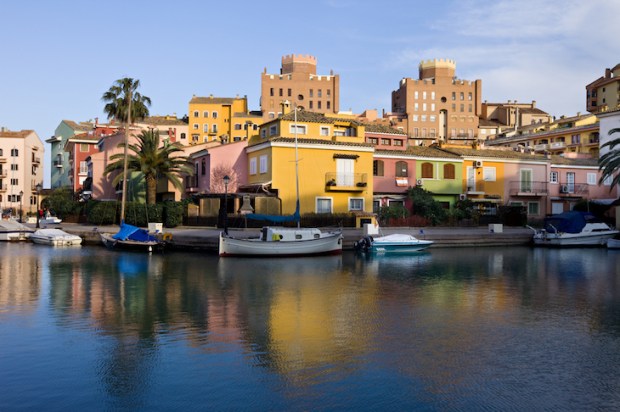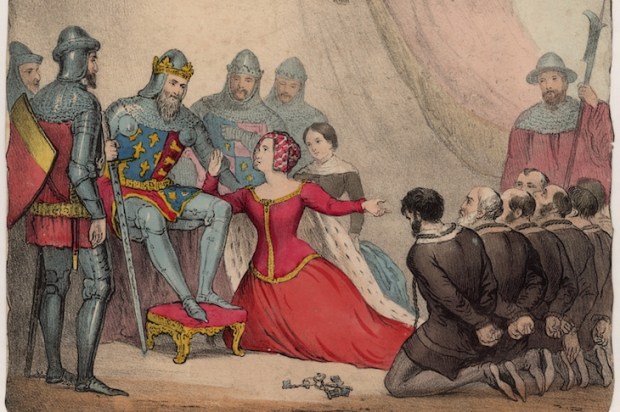On Monday morning I was in a blind panic. The deadline for posted manuscript entries to the Daily Mail First Novel competition is 1730 GMT on Saturday 16 April. But I was in France again. A letter sent from France to Blighty takes between three days and a week. Therefore I had to get my entry — 5,000 words in 12 point Times New Roman, double-spaced, and a 600-word synopsis of the rest — posted by midday at the absolute latest. The winner gets £20,000 and a book deal if he or she can faithfully promise to deliver the finished novel by 31 October. On Monday morning my problems were threefold: the printer had run out of bloody ink; I couldn’t work out how to change my page format from single- to double-spaced; and I couldn’t find a paper clip.
I know these are insignificant problems. And I know that my chances of winning are probably about the same as being murdered in my bed by the Archbishop of Canterbury acting under the malign influence of a recessive gene. All the same, my eyeball-popping frustration with the Hewlett-Packard inkjet printer and with the Pages word-processing application made me lose all sense of proportion. In spite of a less than zero chance of winning, I had of course in my mind’s eye already spent the prize money on half-decent cocaine and women of negotiable affections in exotic locations, so missing the deadline would mean, in effect, that I would be £20,000 worse off.
And, this being France, the town’s post office would probably be shut until further notice to enable the state employees to travel down to Marseilles to throw cobble stones at the police in support of their demand for a one-hour working week. And when I got there it was indeed closed. I ran back to the car and made off with screeching tyres for the next-nearest post office, which is a half-hour drive away.
This post office, in a depressed and depressing former mining town, was open. Jubilant, I rushed inside, nimbly avoided the strapping chap sitting on the floor looking dolefully at the three low-denomination coins in his upturned cap, and looked for a queue to join. But instead of a counter, the down-at-heel crowd was milling around six or eight stands of the kind one sees at a trade fair. While I was trying to decipher from which of these the sending of a small express packet could be arranged, a sort of freelance, roving post-office official materialised in front of me and asked me if he could be of any assistance. I gratefully showed him my thick manila envelope and said that I wanted to send it to England plus vite.
The man was built along the same lines as the French international rugby prop Nicolas Mas. The head was monumental, the eyes squeezed into slits between a massive brow and billowing cheeks. Black bristles, thick as wire, sprouted from his ears, nostrils and cheekbones. He took my packet to roughly assess the weight. In his huge hands the A4 envelope appeared reduced to the size of a postcard.
Progressive thinkers in Britain have been telling us for decades that there is no fundamental difference between male and female. Now they are telling us that gender is fluid, a matter of choice, a movable feast. In Britain, where most people imbibe oestrogen and fluoride from the recycled tap water, and consume plastic-coated food, I suppose this might actually be true. But in France, the number of men who look and act like Desperate Dan is so overwhelming that I can’t see even the French left trying to convince anybody that gender is a matter of whim and experimentation.
So this giant, hyper-male Frenchman is standing there turning this spindle-shanked, zero-testosterone Englishman’s slim packet in his sausage-shaped fingers and looking at it as if it’s a perfumed hankie or something.
‘Qu’est-ce qu’il y a dedans?’ — what’s inside? — he said. ‘My novel,’ I said in French, immediately reducing this grandiose assertion to: ‘Just the first two chapters,’ then still further to: ‘It’s a load of rubbish,’ and finally to: ‘It’s for a Daily Mail competition.’ At the words Daily Mail he nodded respectfully, as if I’d said ‘Winston Churchill’ or ‘Bobby Charlton’.
The guy’s simple faith in the French postal service was really quite moving. A €5 stamp would guarantee delivery in three days maximum, he assured me. He showed me how to operate a self-service weighing-and-payment machine, offered his paw, and wished me bonne chance with my novel. Panic over, on the way out I bent to place a propitiatory libation of two euros in the lining of the upturned cap.
Got something to add? Join the discussion and comment below.
Get 10 issues for just $10
Subscribe to The Spectator Australia today for the next 10 magazine issues, plus full online access, for just $10.















Comments
Don't miss out
Join the conversation with other Spectator Australia readers. Subscribe to leave a comment.
SUBSCRIBEAlready a subscriber? Log in